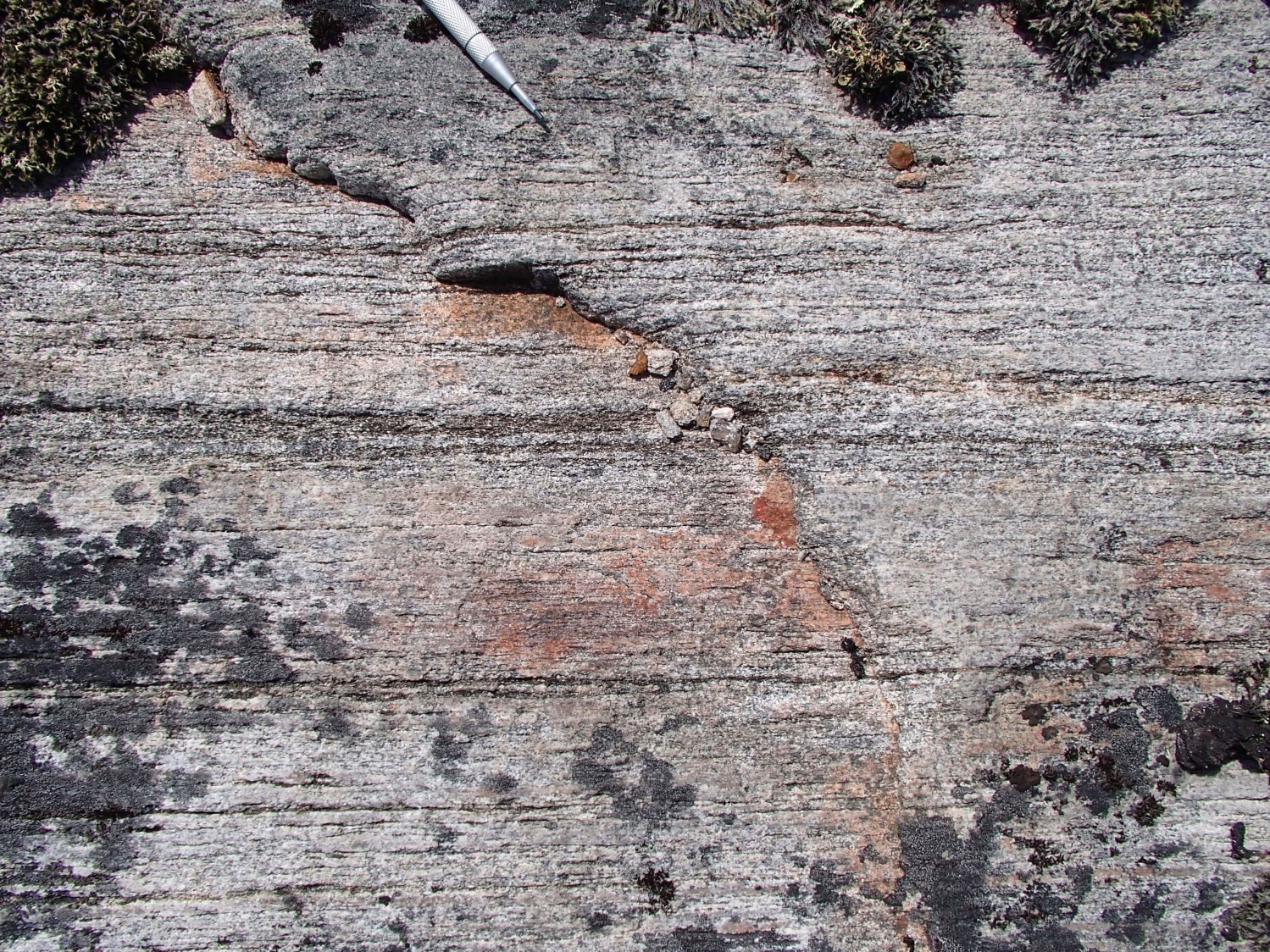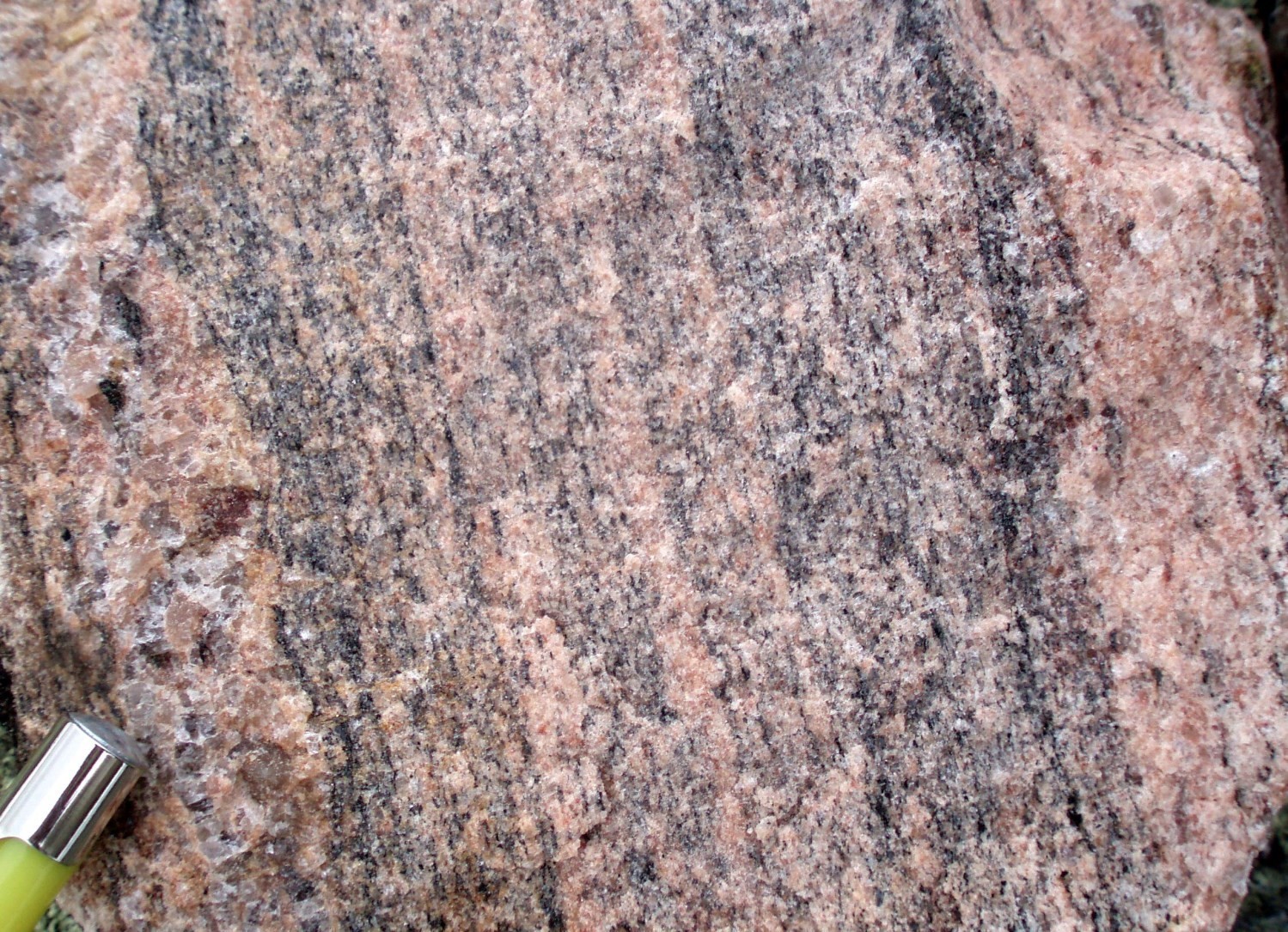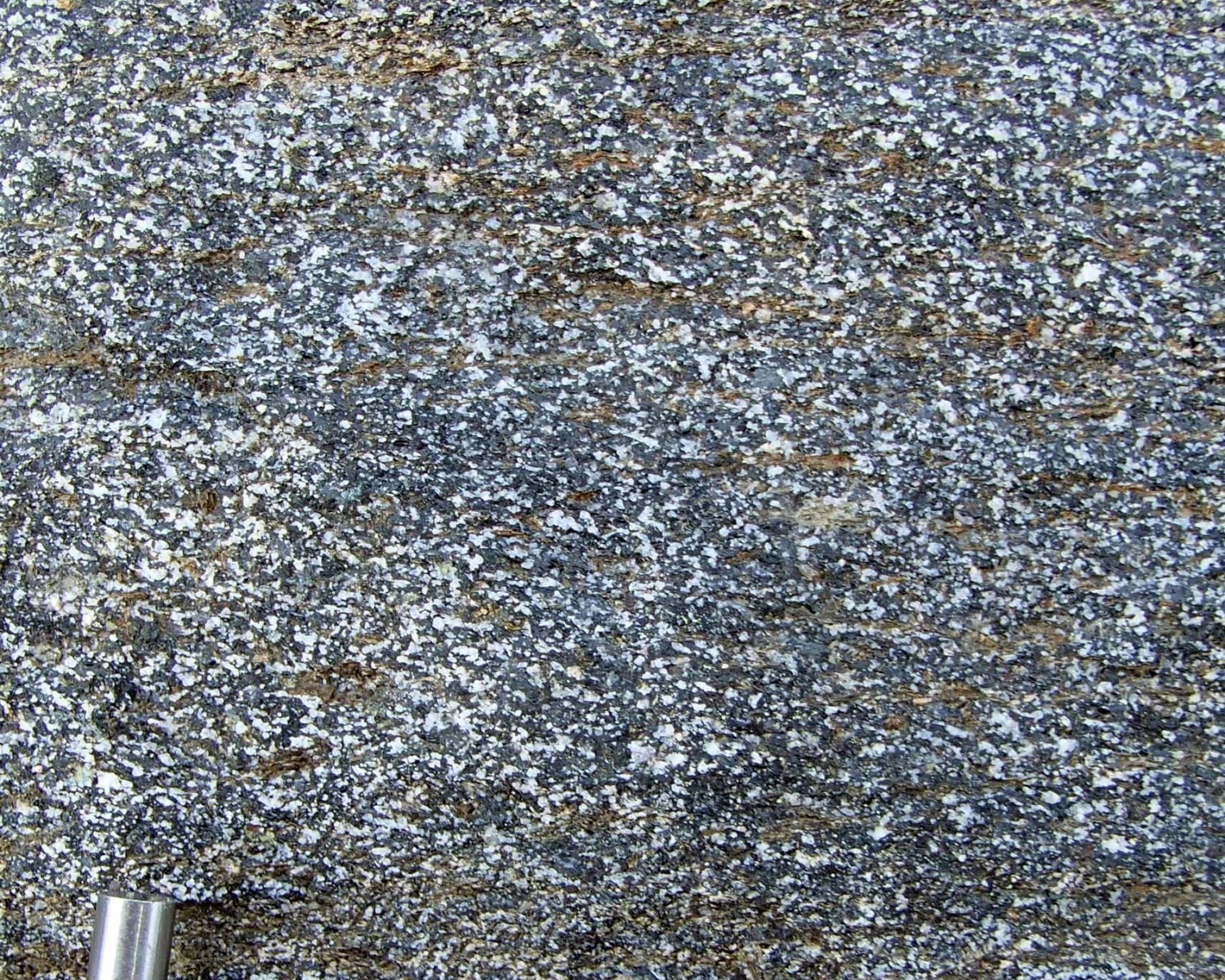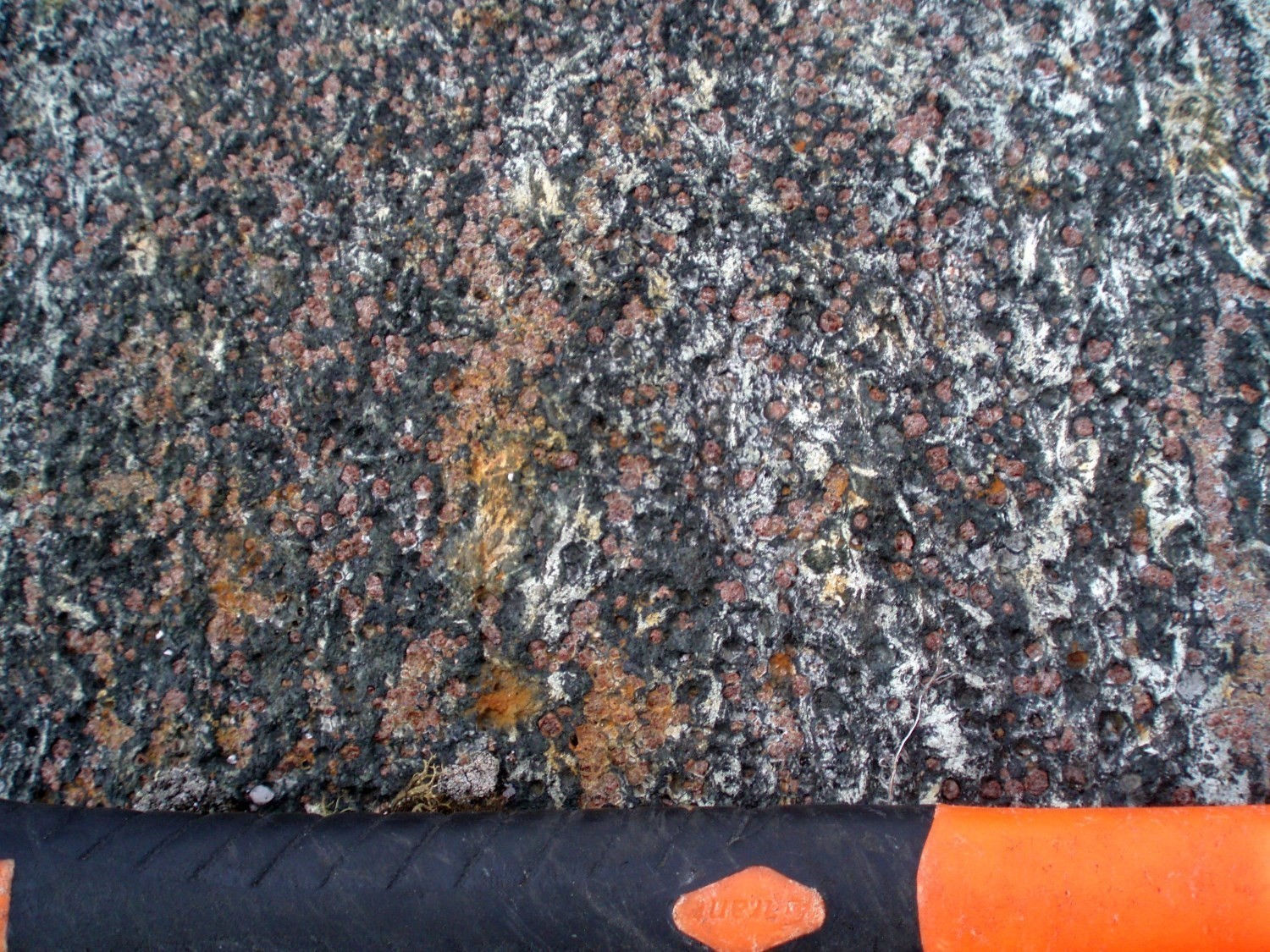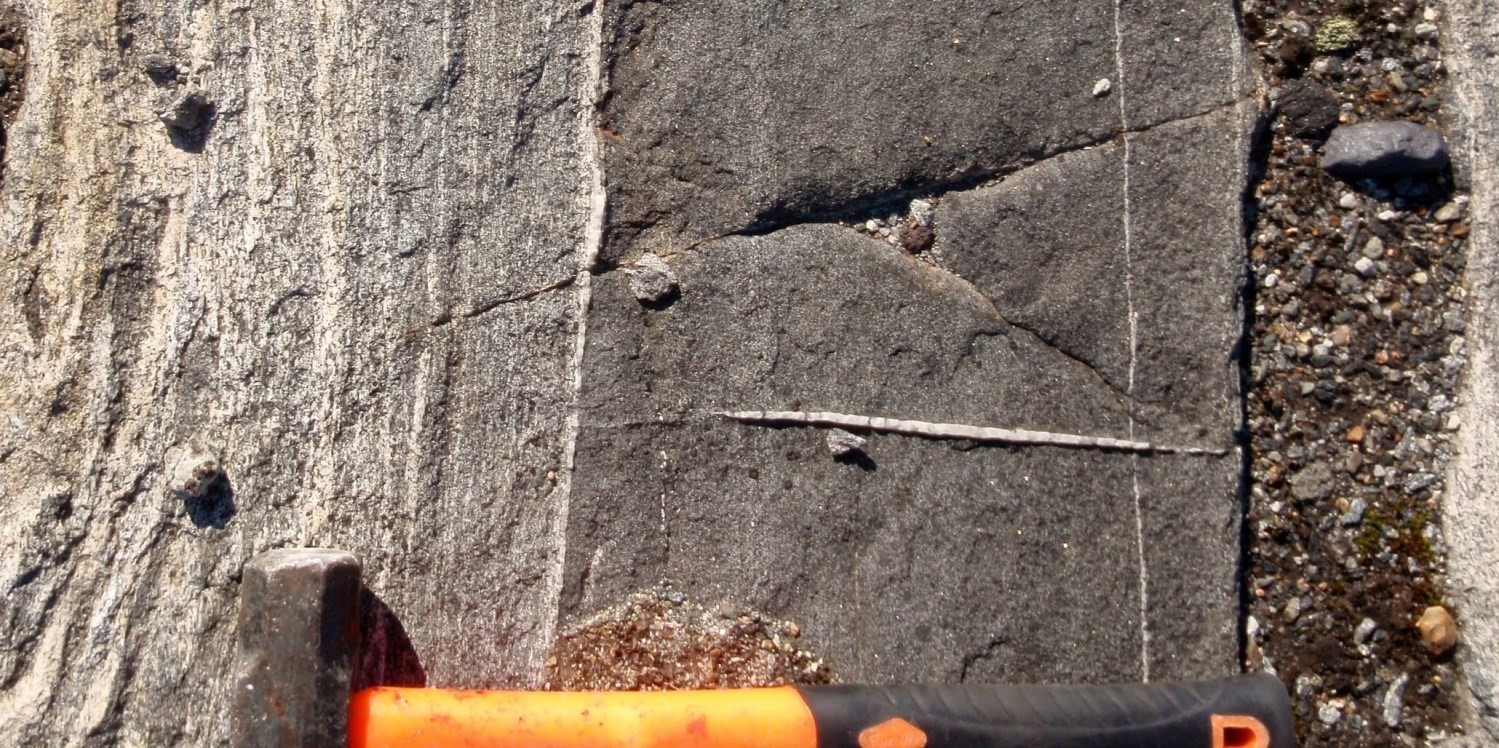
First published: 13 January 2020
Last modified: 10 December 2020
DISCLAIMER: This English version is translated from the original French. In case of any discrepancy, the French version shall prevail.
| Author(s): | Simard et al., 2013 |
| Age: | Archean |
| Stratotype: | None |
| Type area: | Kuujjuaq area (NTS sheet 24K) |
| Geological province: | Churchill Province |
| Geological subdivision: | Rachel-Laporte Lithotectonic Domain |
| Lithology: | Gneiss |
| Category: | Lithodemic |
| Rank: | Complex |
| Status: | Formal |
| Use: | Active |
None
Background
The Rénia Complex was described by Gélinas (1965) as a gneissic dome within the metasedimentary cover of the Rachel-Laporte Lithotectonic Domain. The author proposes that these gneiss form a structural dome exposing older rocks on younger rocks. The Rénia Complex groups rocks of the Rénia and Moyer complexes described by Gélinas (1965) and Simard et al. (2013), as well as part of the “Scattered Gneiss” described by Moorhead and Hynes (1990). These three units were once considered to be part of different thrust sheets (Moorhead and Hynes, 1990). However, the work of Lafrance et al. (2014) demonstrates that these units form a single large gneiss unit now assigned to the Rénia Complex. Thus, the terms “Moyer Complex” and “Scattered Gneiss” were abandoned.
Description
The Rénia Complex consists of two units: mostly granitic gneiss (Area1), and amphibolitized diorite and gabbro (Area2).
Rénia Complex 1 (Area1): Granitic Gneiss
Gneiss of unit Area1 is similar to that of Ungava Complex unit ApPung4, located directly to the east in the Baleine Domain. It is a granitic gneiss, more locally tonalitic, characterized by alternating grey and pink granitic bands, medium-grained, millimetre to centimetre-wide. A late granitic phase, coarse-grained to pegmatitic, possibly Paleoproterozoic, cuts gneiss on most outcrops. This phase injects parallel to gneissosity, accentuating banding. Unit Area1 gneiss contains brown to green biotite (5-15%) aligned with gneissosity, epidote (<3%) and muscovite. The main accessory minerals are chlorite, sphene, apatite, opaque minerals, hematite, zircon, allanite and carbonates. Granitic injections contain <5% ferromagnesian minerals, mostly magnetite and biotite.
Rénia Complex 2 (Area2): Amphibolitized Diorite and Gabbro
Amphibolitized diorite and gabbro of unit Area2 form enclaves and dismembered or boudinaged layers in unit Area1 gneiss. These enclaves and layers are decimetric to metric, but in places reach several hundred metres thick. The rock is homogeneous, foliated, medium to fine grained and dark greenish grey. It is mainly composed of green hornblende (30-60%) and granoblastic plagioclase; in several areas, there is also a significant garnet content (20-30%). Clinopyroxene has been observed locally and the main accessory minerals are biotite, sulphides, magnetite, epidote, chlorite, sphene and apatite.
Thickness and distribution
The Rénia Complex is located in the NW portion of the Saffray Lake area (Lafrance et al., 2014), where it forms a thrust sheet ~57 km long by 18 km wide. It is elongated in a NW-SE direction within the Rachel-Laporte Lithotectonic Domain.
Dating
Dating of a tonalitic gneiss sample, previously assigned to the Moyer Complex, yielded an early Neoarchean age of ~2883 Ma and a Paleoproterozoic metamorphic age of ~1793 Ma related to the New Quebec Orogenesis (Machado et al., 1989). Dating of a muscovite granitic gneiss sample of the Rénia Complex (outcrop 2012-MS-0063) yielded a late Neoarchean age of ~2692 Ma and confirmed metamorphism around 1790 Ma. Archean ages are interpreted as those of gneiss protoliths and are similar to those obtained in the Ungava Complex, in the Baleine Lithotectonic Domain.
| Unit | Sample | Isotopic System | Mineral | Crystallization Age (Ma) | (+) | (-) | Metamorphic Age (Ma) | Reference(s) | ||
| Area1 | Moyer dome | U-Pb | Zircon | 2883 | 6 | 6 | 1793 | 13 | 13 | Machado et al., 1989 |
| 2012-MS-0063A | U-Pb | Zircon | 2692 | 4 | 4 | 1790 | 20 | 20 | Davis et al., 2015 |
Stratigraphic Relationship(s)
The Rénia Complex is part of a large thrust sheet separated in half by a thrust fault delineating two complexes: the Rénia Complex in the north and the Highfall Complex in the south. This sheet is composed of rocks that would originate from the Archean basement, and would have been emplaced within Paleoproterozoic volcano-sedimentary rocks of the Rachel-Laporte Lithotectonic Domain during the New Quebec Orogenesis (1.82-1.77 Ga). It is therefore in fault contact with Laporte Supersuite units. The northern section of the sheet is interpreted as having partially overthrusted the southern section towards the end of deformation. On the edge of the Lac Turcotte Fault, a granitic intrusion of the Mercier Suite (pPmrc2) cuts Archean rocks of the Rénia and Highfall complexes.
Gneiss of unit Area1 is similar to that of unit Aung4 of the Ungava Complex, located directly to the east in the Baleine Lithotectonic Domain.
Paleontology
Does not apply.
References
Publications available through SIGÉOM Examine
DAVIS, D W., MOUKHSIL, A., LAFRANCE, I., HAMMOUCHE, H., GOUTIER, J., PILOTE, P., TALLA TAKAM, F., 2015. Datations U-Pb dans les provinces du Supérieur, de Churchill et de Grenville effectuées au JSGL en 2012-2013. MERN; RP 2014-07, 56 pages.
LAFRANCE, I., SIMARD, M., BANDYAYERA, D., 2014. GEOLOGIE DE LA REGION DU LAC SAFFRAY (SNRC 24F, 24G). MRN; RG 2014-02, 51 pages, 1 plan.
SIMARD, M., LABBE, J Y., MAURICE, C., LACOSTE, P., LECLAIR, A., BOILY, M., 2008. SYNTHESE DU NORD-EST DE LA PROVINCE DU SUPERIEUR. MRNF; MM 2008-02, 198 pages, 8 plans.
SIMARD, M., LAFRANCE, I., HAMMOUCHE, H., LEGOUIX, C., 2013. GEOLOGIE DE LA REGION DE KUUJJUAQ ET DE LA BAIE D’UNGAVA (SNRC 24J, 24K). MRN; RG 2013-04, 62 pages, 1 plan.
Other publications
GÉLINAS, L.1965. Région de la région de Fort Chimo et des lacs Gabriel et Thévenet, Nouveau-Québec. Thèse de doctorat, université Laval, Québec; 212 pages.
MACHADO, N., GOULET, N., GARIEPY, C. 1989. U-Pb geochronology of reactivated Archean basement and of Hudsonian Trough. Canadian Journal of Earth Sciences; volume 26, pages 1-15. https://doi.org/10.1139/e89-001
Suggested Citation
Ministère de l’Énergie et des Ressources naturelles (MERN). Rénia Complex. Quebec Stratigraphic Lexicon. https://gq.mines.gouv.qc.ca/lexique-stratigraphique/province-de-churchill/complexe-de-renia_en [accessed on Day Month Year].
Contributors
|
First publication |
Isabelle Lafrance, P. Geo., M.Sc. isabelle.lafrance@mern.gouv.qc.ca (redaction) Mehdi A. Guemache, P. Geo., Ph.D. (coordination); Benoit Charette, P. Geo., M.Sc. (critical review); Simon Auclair, P. Geo., M.Sc. (editing); Céline Dupuis, P. Geo., Ph.D. (English version); Nathalie Bouchard (HTML editing). |


